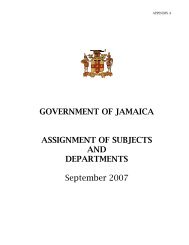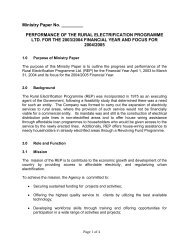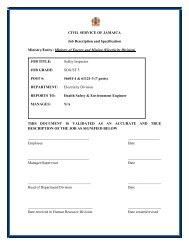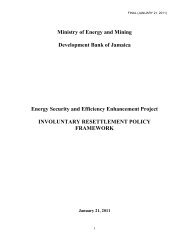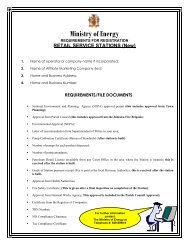Jamaica Biofuels Report - Ministry of Energy
Jamaica Biofuels Report - Ministry of Energy
Jamaica Biofuels Report - Ministry of Energy
You also want an ePaper? Increase the reach of your titles
YUMPU automatically turns print PDFs into web optimized ePapers that Google loves.
3. Human and Institutional Resources and Roles3.1 Ethanol IndustrySince <strong>Jamaica</strong>n cane ethanol capacity will be built on top <strong>of</strong> the existing (or an expanded)sugarcane infrastructure, a significant amount <strong>of</strong> agriculture and cane processing skills alreadyexists in the country’s sugar industry. The additional skills that will be required at theengineering and operating levels are related to the ethanol production portion <strong>of</strong> the process:(1) Fermentation and (2) Distillation. Both processes are <strong>of</strong>f-the-shelf and hence wellestablished and delivered as turn-key operations with adequate training available from themanufacturers.Experience in industrial microbiology will be needed to operate and maintain the fermentationunits <strong>of</strong> sugar and/or molasses to ethanol. It will be essential for the plant to have amicrobiologist or chemical engineer with experience in a fermentation setting, such as beer,wine or spirits production in <strong>Jamaica</strong> or other countries. Yeast is the fermentative organismemployed in ethanol production; hence, the microbiologist/engineer should understandthoroughly the field <strong>of</strong> yeast metabolism, inoculation, cultivation, harvesting, andcontamination control.Equally important is expertise in the operation and maintenance <strong>of</strong> distillation units consisting<strong>of</strong> distillation columns and molecular sieves. Ethanol produced during fermentation is dilute,usually 5-10% in water. As a result, distillation is necessary to remove large quantities <strong>of</strong> waterand concentrate ethanol to 95.6% by weight, which is hydrous ethanol. The final step forproduction <strong>of</strong> anhydrous ethanol, which is the only appropriate form for blending with gasoline,requires the use <strong>of</strong> molecular sieves. Personnel with such skills can be recruited from otherindustries that employ distillation processes, such as <strong>Jamaica</strong>’s three dehydration facilities orforeign cane or corn ethanol plants.Power cogeneration and the necessary human skills are essential to the long-term success <strong>of</strong>the cane ethanol industry, as the Brazilian experience has demonstrated. Bagasse, whichconstitutes approximately 13% <strong>of</strong> the raw cane mass, is an excellent fuel for power generation.Power generation from bagasse is practiced extensively in Brazil and South Florida using low- orhigh-pressure boiler systems to satisfy almost entirely the power and steam needed for sugarextraction and refining. Excess electricity is exported to the grid. As emphasized throughoutthis report, cogeneration is essential to the long-term financial viability <strong>of</strong> the cane ethanolindustry.Cane trash, available in roughly equal amounts as bagasse, is an additional fuel, but it iscurrently left in the fields. As foreign sugar mills are evaluating the use <strong>of</strong> cane trash, <strong>Jamaica</strong>can benefit from future developments in this area.25




